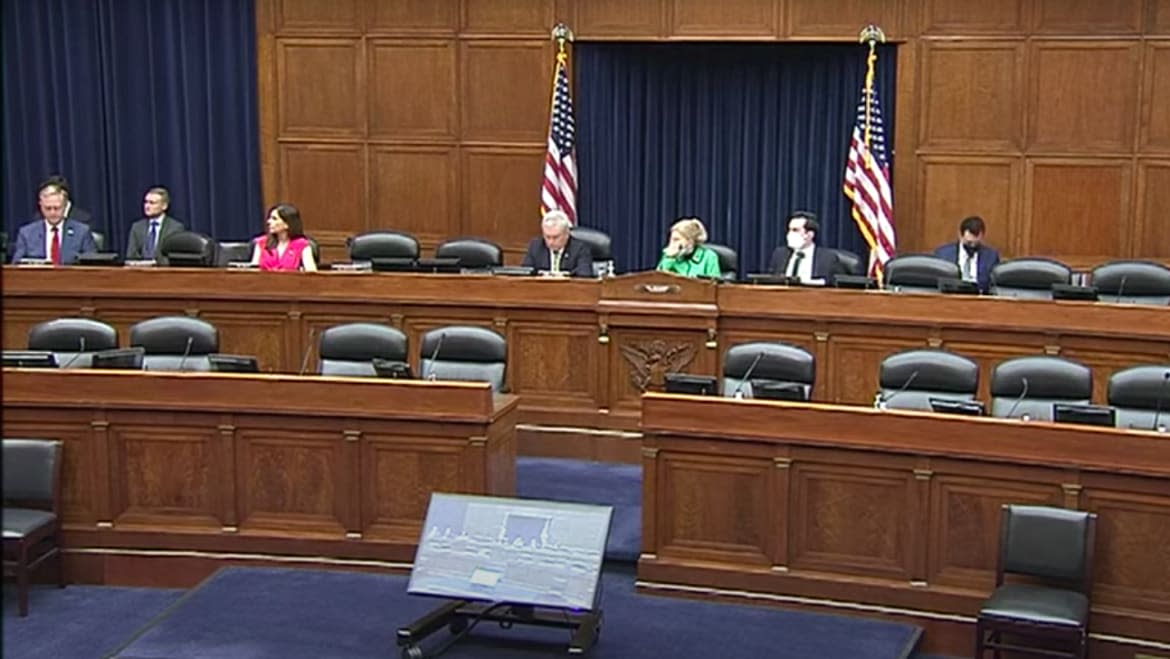HBCU Student Leaders Confront Congress on ‘Painful’ Bomb Threats

Black student leaders gave emotional testimony before Congress on Thursday about a wave of bomb threats that have recently plagued historically black colleges and universities.
An FBI official said at the Thursday hearing that authorities have “narrowed down” a list of persons of interest—and believe one minor is responsible for most of the threats— but Black students still feel uneasy about their safety.
“We must always be proactive,” Jackson State University Thomas K. Hudson insisted.
New Wave of ‘Disturbing’ Bomb Threats Force HBCUs Into Lockdown
Three student representatives from schools targeted by the bomb threats addressed the House Oversight Committee, detailing the cultural pride they have in their HBCUs. But they’ve been disheartened by the events of the past year—and specifically, Black History Month 2022, which saw a noticeable rise in threats against the academic institutions.
“When bigoted, cowardiced actors began to issue violent bomb threats to Howard University and dozens of other HBCUs at the start of 2022, it was clear that their intentions were to dismantle sacred pentacles of Black excellence,” Howard University Student Association president Kylie Burke told lawmakers. “Unmistakably, the highest concentration of these threats were delivered on the first day of Black History Month.”
Emmanuel Ukot, president of the Student Government Association at Xavier University of Louisiana, said the threats were “especially painful” because HBCU students are “developing ourselves to make positive impacts in our communities in the long-run.”
“Racial violence against HBCUs is a multi-generational occurrence that profoundly impacts the Black community. My family and I are examples of this multi-generational trauma,” Devan M. Vilfrard, the associate chief justice of the Student Supreme Court at Florida A&M University, told the panel. “Historically Black Colleges and Universities have been long-standing symbols of support and a path toward success for Black communities across our nation for generations and will continue to provide this for generations to come.”
The executive assistant director of the FBI’s intelligence branch, Ryan Young, sought to ensure the students that investigating the bomb threats remains one of the agency’s highest priorities.
Young acknowledged the FBI had narrowed its lists of suspects, indicating that the person believed to be responsible for most of the incidents is a juvenile. But he wouldn’t give more information on the person’s location and motive, and whether or not they were acting alone.
FBI Suspects HBCU Threats Could Be Linked to 6 ‘Savvy’ Kids: Report
“The FBI recognizes that hate crimes remain a concern for communities across the country and collects mandatory reporting from federal law enforcement agencies,” Young said. “Reporting remains voluntary for state, local, and tribal law enforcement agencies. The FBI has hate crime statistics. …Additionally, the FBI created a multicultural engagement council composed of ethnic, religious, and minority leaders to better understand and devise solutions for these communities.”
When grilled by multiple lawmakers on the exact figures of how often hate crimes are addressed at HBCUs in comparison to other educational institutions, Young could not respond.
Rep. Jamie Raskin (D-MD), chairman of the Subcommittee on Civil Rights and Civil Liberties, said there had been a 50-percent increase in hate crimes against Black Americans from 2019 to 2020. He also noted 36 HBCUs had received more than 50 threats since the start of 2022. One such incident included a 20-minute phone call to Bethune-Cookman College in Florida from a man who claimed to be part of a neo-Nazi organization.
While most Congress members at the hearing focused on the safety of HBCUs, a couple of Republican lawmakers used it as an opportunity to denounce proponents of “Defund the Police” campaigns.
Rep. Fred Keller (R-PA) started his speech touching on the current crisis in Ukraine, saying the U.S. “cannot advocate for peace internationally without also addressing violence within our own borders.”
HBCU Students ‘on Edge’ After Fresh Round of Bomb Threats
“Violence on any level is unacceptable,” he said.
Then, he went in another direction.
“What effect do you think defunding the police would have on the already high crime rates?” he asked Young.
After Young said the FBI does not have accurate and consistent data from local governments, which impacts relationships and how resources are used within those communities, Keller suggested most advocates for defunding the police are Black.
Keller was not alone in his sentiments.
Rep. Nancy Mace (R-SC) talked about her own college experience and how she received threats when she was the first woman to graduate from The Citadel. After finishing her spiel, she asked questions about security on campuses and how federal authorities responded, and indicated that Black communities would suffer the most from defunding the police.
Despite those slight political distractions—and the menacing threats they’ve endured—students remained optimistic about their futures at HBCUs and celebrating Black culture.
“We still celebrated Black History Month,” Ukot said later in an interview with The Daily Beast. “I also think it lit a fire under students again about why it’s so important to recognize the importance of HBCUs and our contribution to society.”
“I never had a conversation or saw a conversation where [the threats] encouraged students to leave the HBCU community,” Burke said. “If anything, I think it connected us and united us because we were all facing the same circumstances.”
Get the Daily Beast's biggest scoops and scandals delivered right to your inbox. Sign up now.
Stay informed and gain unlimited access to the Daily Beast's unmatched reporting. Subscribe now.

